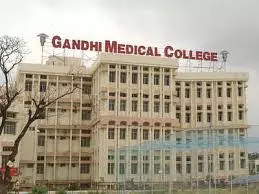Faculty, Doctors Raise Pay, Policy, and Training Concerns with National Medical Commission Chairman
Doctors in govt medical colleges flag unequal pay, costly promotions, outdated norms in NMC meet; seek urgent reforms and state support.

Hyderabad: Unequal pay across states, high training costs, outdated infrastructure norms, and lack of clarity in promotion requirements are among the key issues troubling doctors and faculty in government medical colleges. These concerns were laid out during an interaction between postgraduate students and faculty from Osmania and Gandhi medical colleges and Dr B.N. Gangadhar, chairman of the National Medical Commission (NMC) on Saturday. Many called for urgent reforms, while others sought immediate relief for problems that have persisted for years.
One of the most pressing demands was the need for uniform pay. “Why should a faculty member in one state earn less than a counterpart with the same qualifications and responsibilities elsewhere,” a doctor asked during the session. While the NMC chairman acknowledged the concern, he clarified that pay structures fall under the jurisdiction of state governments.
Another widespread concern was the burden of accumulating credit points required for career progression, which often involve expensive conferences. “Not everyone can afford travel, registration, and accommodation. We’re expected to do this regularly just to stay eligible for promotions,” said a senior faculty member, requesting state-funded reimbursements or policy relaxation.
Doctors also asked for a service quota for super-specialty admissions, eligibility for biochemistry postgraduates in endocrinology, renaming of the community medicine branch, and structured training in thesis and dissertation writing for postgraduates. Many called for government reimbursement of the medical education technology (MET) course fees, which were described as prohibitively high.
Technical issues related to face-recognition attendance systems were also raised, especially in sprawling campuses. The NMC responded that colleges would be allowed multiple latitude-longitude entries to ensure smoother access.
Infrastructure requirements were another sore point. Several doctors criticised the current minimum standard requirements (MSR) framework for hospitals, calling it insufficient for real-world demands in public healthcare. The NMC agreed that the existing MSRs needed revision and assured that the norms would be increased.
Doctors also flagged the growing trend of unqualified practitioners in dermatology and stressed the need for tighter regulation. Separately, the digitalisation of medical education was discussed, with participants urging faster adoption of tech-enabled tools for learning and evaluation.
While the NMC promised to review many of the concerns, implementation is expected to depend on state cooperation and follow-through at the institutional level.

